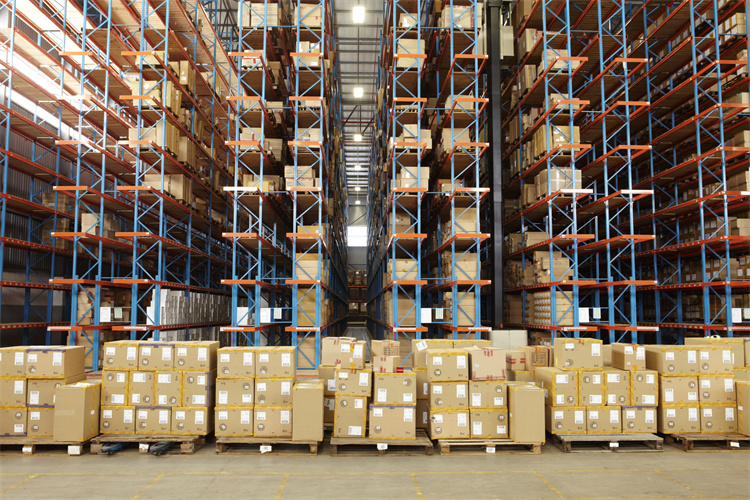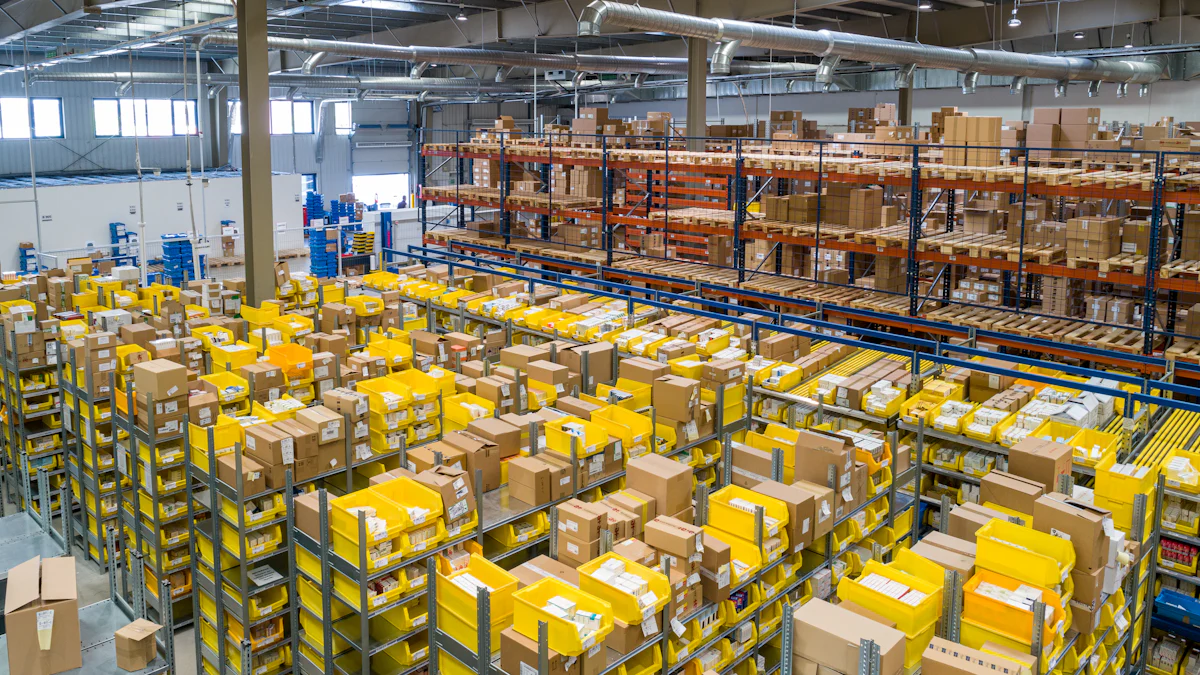Understanding the Different Types of Warehousing

Warehousing serves as the backbone of supply chain management, providing a centralized location for storing inventory and ensuring efficient logistics operations. It plays a vital role in optimizing processes and delivering products to customers on time. Different types of warehousing, such as public, private, bonded, and smart warehouses, cater to diverse business needs. Selecting the right warehouse type can significantly impact operational efficiency, reduce costs, and enhance customer satisfaction, making it a critical decision for businesses aiming for long-term success.
Public Warehousing: A Flexible Storage Solution
Definition and Overview
A public warehouse provides storage facilities that businesses can rent on a short-term or long-term basis. These warehouses cater to companies that lack their own storage infrastructure or need additional space during peak seasons. Operated by third-party providers, public warehousing offers a cost-effective solution for businesses of all sizes. It supports industries ranging from retail to manufacturing by ensuring efficient inventory management and seamless logistics operations.
Public warehouses often serve as hubs for storing goods before they are distributed to retailers or customers. They play a critical role in supply chain management by bridging the gap between production and consumption. As Alison Belloise, President of Stone Management, highlights, “Each time a good is moved, the cost of producing a good increases. Clients want to maximize their dollars by getting their product to its end user as fast and as inexpensive as possible.” Public warehousing aligns with this goal by minimizing storage costs while maintaining operational efficiency.
Key Features of Public Warehouses
Public warehouses come equipped with features designed to meet diverse business needs. These facilities often include:
Flexible Storage Options: Businesses can rent space based on their specific requirements, whether for a few pallets or an entire section of the warehouse.
Advanced Inventory Management Systems: Many public warehouses utilize technology to track inventory in real time, ensuring accuracy and transparency.
Value-Added Services: Services such as picking, packing, labeling, and shipping are commonly offered, making public warehouses ideal for businesses seeking end-to-end logistics solutions.
Strategic Locations: Public warehouses are often situated near major transportation hubs or distribution centers, reducing transit times and costs.
These features make public warehousing a versatile option for businesses looking to optimize their supply chain operations without significant capital investment.
Despite these challenges, public warehousing remains a practical choice for businesses seeking flexibility and efficiency in their logistics operations.
Public warehouses offer a cost-effective alternative to building and maintaining private storage facilities. Companies can rent space based on their specific needs, avoiding unnecessary expenses. This model is particularly beneficial for businesses operating on tight budgets or those seeking to optimize their supply chain costs.
Private Warehousing: Tailored for Exclusive Use
Definition and Overview
A private warehouse is a storage facility owned and operated by a single business for its exclusive use. Unlike public warehouses, which cater to multiple clients, private warehousing provides businesses with complete control over their inventory and operations. These facilities are often built to meet specific requirements, ensuring that they align with the company’s unique needs.
Private warehousing is commonly utilized by large-scale enterprises with consistent storage demands. These businesses often require dedicated spaces to manage inventory efficiently and support their supply chain operations. By owning a private warehouse, companies can streamline logistics processes, reduce dependency on third-party providers, and enhance overall operational efficiency.
Supply Chain Expert, a professional in warehousing and logistics, emphasizes, “Private warehousing offers efficient inventory management, reduced transportation costs, better security, flexibility for customization, and branding opportunities.”
This approach allows businesses to maintain tighter control over their supply chain while creating opportunities for long-term cost savings.
Key Features of Private Warehouses
Private warehouses come equipped with features that cater to the specific needs of the owning business. These features ensure that the facility operates efficiently and supports the company’s broader logistics strategy.
Customizable Layouts: Businesses can design the warehouse layout to optimize storage and workflow, ensuring maximum efficiency.
Advanced Technology Integration: Many private warehouses incorporate cutting-edge inventory management systems, robotics, and automation to enhance productivity.
Enhanced Security Measures: Private facilities often include advanced security systems, such as surveillance cameras, access controls, and alarm systems, to protect valuable inventory.
Proximity to Distribution Centers: Companies strategically locate private warehouses near key distribution centers to minimize transportation costs and delivery times.
Branding Opportunities: Owning a private warehouse allows businesses to showcase their brand identity through customized designs and signage.
These features make private warehousing an attractive option for companies seeking tailored solutions to meet their operational needs.
Despite these challenges, private warehousing remains a valuable solution for businesses with consistent storage demands and the resources to invest in dedicated facilities.
Private warehouses excel in scenarios where businesses prioritize control, efficiency, and long-term value. Their ability to adapt to specific operational needs makes them a preferred choice for enterprises aiming to optimize their supply chain while maintaining a competitive edge.
Bonded Warehousing: Secure Storage for International Trade
Definition and Overview
Bonded warehouses serve as specialized storage facilities designed to hold imported goods before customs clearance or payment of import duties. These warehouses operate under strict government regulations, ensuring compliance with customs laws and trade policies. Businesses can store goods in a bonded warehouse for an extended period without immediately paying taxes or tariffs. This arrangement provides companies with financial flexibility and operational efficiency.
Bonded warehouses play a critical role in international trade by acting as secure storage hubs for goods awaiting distribution. They allow businesses to defer costs until the goods are ready for sale or export. This system benefits industries dealing with high-value imports or complex supply chains. By offering a controlled environment, bonded warehouses ensure that goods remain safe and compliant with customs requirements.
"Bonded warehouses provide a secure solution for storing imported goods while deferring taxes or tariffs until distribution," as outlined in global trade regulations.
Key Features of Bonded Warehouses
Bonded warehouses offer unique features that cater to the needs of businesses engaged in international trade. These features enhance their functionality and make them indispensable for managing cross-border logistics.
Deferred Payment of Duties: Businesses can delay paying import duties and taxes until the goods leave the warehouse for distribution or sale.
Secure Storage Environment: Bonded warehouses maintain high-security standards, ensuring the safety of goods during storage.
Customs Supervision: These facilities operate under the supervision of customs authorities, ensuring compliance with trade regulations.
Extended Storage Periods: Goods can remain in bonded warehouses for months or even years, depending on local regulations.
Value-Added Services: Many bonded warehouses offer services such as packaging, labeling, and quality inspections to prepare goods for distribution centers or export.
These features make bonded warehouses a strategic choice for businesses seeking to optimize their supply chain operations while navigating the complexities of international trade.
Bonded warehouses excel in scenarios requiring secure storage, regulatory compliance, and financial flexibility. Their ability to address the complexities of international trade makes them a vital component of modern supply chain strategies.
Smart Warehousing: The Future of Logistics

Definition and Overview
A smart warehouse represents a cutting-edge evolution in logistics, integrating advanced technologies to automate and optimize operations. Unlike traditional facilities, these warehouses rely on systems such as robotics, automated guided vehicles (AGVs), and automated storage and retrieval systems (AS/RS) to handle tasks with precision and speed. By leveraging data analytics and Internet of Things (IoT) devices, smart warehouses provide real-time visibility into inventory and streamline workflows.
Smart warehouses have become pivotal in modern supply chains. They bridge the gap between production and distribution centers by ensuring faster processing times and reducing human error. As logistics demands grow more complex, businesses increasingly turn to smart warehousing to enhance efficiency and maintain a competitive edge.
"Smart warehouses significantly enhance efficiency, accuracy, and productivity by integrating automated systems," according to Inbound Logistics. This transformation allows businesses to optimize space, reduce labor costs, and improve inventory accuracy.
Key Features of Smart Warehouses
Smart warehouses stand out due to their innovative features, which redefine how goods are stored, managed, and distributed. These features enable businesses to meet the demands of a fast-paced market while maintaining operational excellence.
Automation and Robotics: Robots and AGVs handle repetitive tasks like picking, packing, and transporting goods. This reduces reliance on manual labor and accelerates order fulfillment.
Real-Time Inventory Tracking: IoT sensors and RFID tags provide continuous updates on inventory levels. This ensures accurate stock management and minimizes the risk of overstocking or shortages.
Data-Driven Decision Making: Advanced analytics tools process vast amounts of data to identify trends, predict demand, and optimize warehouse layouts.
Seamless Integration with Distribution Centers: Smart warehouses connect directly with distribution centers, enabling faster transfers and reducing transit times.
Energy Efficiency: Many smart warehouses incorporate energy-saving technologies, such as LED lighting and automated climate control, to reduce operational costs and environmental impact.
These features make smart warehouses indispensable for businesses aiming to stay ahead in an increasingly competitive logistics landscape.
Smart warehousing represents the future of logistics, offering unparalleled efficiency and adaptability. Its ability to integrate seamlessly with distribution centers and leverage advanced technologies positions it as a cornerstone of modern supply chain strategies.
Smart warehouses cater to diverse business needs, providing tailored solutions for industries ranging from e-commerce to manufacturing. Their ability to adapt to changing demands and integrate advanced technologies positions them as a cornerstone of modern logistics strategies.
Fulfillment Centers: Optimizing E-Commerce Operations

Definition and Overview
Fulfillment centers play a pivotal role in e-commerce logistics by managing the storage, processing, and shipping of online orders. These facilities act as intermediaries between businesses and customers, ensuring that products move efficiently from the warehouse to the end user. Unlike traditional warehouses, which primarily focus on long-term storage, fulfillment centers prioritize rapid order processing and delivery.
E-commerce businesses rely on fulfillment centers to handle tasks such as inventory management, order picking, packing, and shipping. These centers streamline operations by integrating advanced technology and automation, enabling businesses to meet the growing demand for fast and accurate deliveries. By optimizing these processes, fulfillment centers help companies enhance customer satisfaction and maintain a competitive edge in the market.
"Fulfillment centers are the backbone of e-commerce operations, ensuring that customers receive their orders quickly and accurately," according to industry experts.
Key Features of Fulfillment Centers
Fulfillment centers offer a range of features designed to support the unique needs of e-commerce businesses. These features ensure efficient operations and seamless order fulfillment.
Order Processing Efficiency: Fulfillment centers prioritize speed and accuracy in processing orders. Advanced systems and automation enable quick picking, packing, and shipping.
Real-Time Inventory Tracking: Many fulfillment centers utilize inventory management software to provide businesses with real-time updates on stock levels. This ensures accurate inventory control and prevents stockouts or overstocking.
Strategic Locations: Fulfillment centers are often situated near major distribution centers or transportation hubs. This reduces transit times and ensures faster delivery to customers.
Scalability: These facilities can accommodate fluctuating order volumes, making them ideal for businesses experiencing seasonal demand spikes or rapid growth.
Value-Added Services: Fulfillment centers often provide additional services such as kitting, labeling, and returns management. These services enhance operational efficiency and improve the overall customer experience.
These features make fulfillment centers indispensable for e-commerce businesses aiming to optimize their supply chain and meet customer expectations.
Contract Warehouses: Customized Solutions for Businesses
Definition and Overview
Contract warehouses provide tailored storage and logistics solutions for businesses seeking flexibility and efficiency. Unlike public warehouses, which cater to multiple clients on a short-term basis, contract warehousing involves an agreement between a business and a warehouse provider for a specified period. This arrangement ensures that the warehouse dedicates resources and space to meet the unique needs of the client.
Contract warehousing offers two primary models: dedicated contract warehousing and shared contract warehousing. Dedicated contract warehousing assigns an entire facility or section exclusively to one client, ensuring complete control and customization. Shared contract warehousing, on the other hand, allows multiple businesses to share the same facility, optimizing costs while maintaining operational efficiency.
Crown LSP Group, a leader in contract warehousing, highlights, “One excellent benefit of a contract warehouse over a public warehouse is that it can provide a dedicated workforce. While a public warehouse is mostly concerned with keeping its storage at full capacity, a contract warehouse knows it can rely on predictable storage needs and assign more resources to individual clients.”
This approach makes contract warehouses ideal for businesses requiring specialized services, predictable storage needs, or long-term partnerships with logistics providers.
Key Features of Contract Warehouses
Contract warehouses stand out due to their ability to offer customized solutions. Their features cater to businesses across industries, ensuring seamless supply chain operations. Key features include:
Customizable Storage Solutions: Contract warehouses adapt layouts, storage systems, and workflows to meet the specific requirements of each client. This flexibility supports businesses handling unique or high-value goods.
Dedicated Workforce: These facilities often provide a team of trained professionals focused solely on the client’s operations. This ensures efficient inventory management and order fulfillment.
Flexible Fee Structures: Contract warehousing offers various pricing models, such as fixed fees, cost-plus agreements, or hybrid structures. This flexibility allows businesses to manage costs effectively.
Integration with Distribution Centers: Many contract warehouses connect directly with distribution centers, enabling faster transfers and reducing transit times.
Value-Added Services: Services like packaging, labeling, quality inspections, and reverse logistics enhance the overall efficiency of supply chain operations.
These features make contract warehouses a strategic choice for businesses aiming to optimize their logistics while maintaining control over their operations
Contract warehouses excel in scenarios requiring tailored solutions, predictable operations, and cost efficiency. Their ability to adapt to diverse business needs makes them a strategic asset for companies aiming to optimize their supply chain and achieve long-term success.
JUSDA's Warehousing Solutions: A Global Perspective
Overview of JUSDA's Warehousing Services
JUSDA offers comprehensive warehousing services designed to meet the diverse needs of businesses across industries. With a global network of facilities, JUSDA provides storage solutions that cater to various commodities, including products, equipment, vehicles, and perishable goods. The company integrates advanced technology into its operations, ensuring efficient inventory management and seamless logistics processes.
At the core of JUSDA's warehousing services lies the JusLink smart system platform. This innovative platform connects suppliers, manufacturers, service providers, and customers, fostering collaboration and enabling real-time data sharing. By leveraging JusLink, businesses gain access to accurate analytics for informed decision-making and optimized resource utilization. This approach ensures that JUSDA's clients can streamline their supply chain operations while maintaining high levels of efficiency.
JUSDA's facilities also support businesses with flexible storage options. Whether companies require short-term or long-term storage, JUSDA provides tailored solutions to accommodate fluctuating demands. These services are particularly beneficial for businesses navigating seasonal demand spikes or expanding into new markets. By offering scalable and adaptable warehousing solutions, JUSDA empowers businesses to focus on growth and innovation.

JUSDA Solutions
To provide you with professional solutions and quotations.
How JUSDA's Warehousing Solutions Cater to Diverse Industries
JUSDA's warehousing solutions are tailored to meet the unique needs of various industries, ensuring that businesses receive specialized support for their operations. The company's expertise spans multiple sectors, including manufacturing, retail, automotive, and e-commerce.
Manufacturing: JUSDA's warehouses provide manufacturers with secure storage for raw materials and finished goods. The integration of JusLink allows manufacturers to track inventory in real time, ensuring smooth production schedules and timely deliveries to distribution centers.
Retail: Retailers benefit from JUSDA's strategically located warehouses, which enable faster replenishment of store shelves and efficient handling of seasonal inventory. The value-added services offered by JUSDA, such as labeling and packaging, help retailers maintain brand consistency and meet customer expectations.
Automotive: JUSDA supports the automotive industry by offering specialized storage solutions for parts and components. The company's facilities ensure that inventory remains organized and accessible, reducing downtime and improving supply chain efficiency.
E-Commerce: E-commerce businesses rely on JUSDA's warehouses to manage high order volumes and ensure rapid order fulfillment. The proximity of JUSDA's facilities to distribution centers minimizes transit times, enhancing customer satisfaction.
Perishable Goods: JUSDA's warehouses include climate-controlled environments for storing temperature-sensitive items such as food and pharmaceuticals. These facilities maintain optimal conditions, ensuring product quality and compliance with industry standards.
By catering to the specific requirements of each industry, JUSDA delivers customized warehousing solutions that drive operational success. The company's commitment to innovation and efficiency positions it as a trusted partner for businesses worldwide.
Warehousing plays a pivotal role in supply chain management, offering diverse options to meet specific business needs. Public warehouses provide flexibility, private warehouses ensure control, and bonded warehouses support international trade. Smart warehouses and fulfillment centers cater to modern logistics demands, while contract warehouses offer tailored solutions. Selecting the right warehouse type aligns operations with business goals, enhancing efficiency and reducing costs. JUSDA's warehousing solutions, with advanced technology and global reach, empower businesses to optimize their supply chains and achieve sustainable growth.
See Also
Understanding Robotic Automation's Impact on Warehouse Efficiency
The Importance of Automating Your Warehouse Operations
Boosting Warehouse Productivity Through Logistics Robotics
Discover JUSDA's Innovative Warehousing Solutions for Efficiency
